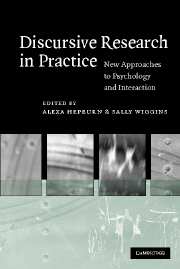Book contents
- Frontmatter
- Contents
- List of figures
- List of contributors
- Acknowledgements
- 1 Discursive research: themes and debates
- Part I Psychology in action
- Part II Professionals and clients
- Part III Youth and institutions
- 11 ‘Doing reluctance’: managing delivery of assessments in peer evaluation
- 12 A valid person: non-competence as a conversational outcome
- 13 Discursive practices in talking problems during a school–family meeting
- 14 Food abuse: mealtimes, helplines and ‘troubled’ eating
- 15 Discursive research: applications and implications
- Appendix: transcription notation
- References
- Index
11 - ‘Doing reluctance’: managing delivery of assessments in peer evaluation
Published online by Cambridge University Press: 04 November 2009
- Frontmatter
- Contents
- List of figures
- List of contributors
- Acknowledgements
- 1 Discursive research: themes and debates
- Part I Psychology in action
- Part II Professionals and clients
- Part III Youth and institutions
- 11 ‘Doing reluctance’: managing delivery of assessments in peer evaluation
- 12 A valid person: non-competence as a conversational outcome
- 13 Discursive practices in talking problems during a school–family meeting
- 14 Food abuse: mealtimes, helplines and ‘troubled’ eating
- 15 Discursive research: applications and implications
- Appendix: transcription notation
- References
- Index
Summary
As the site of young people's daily affairs, school is the home of peer culture. This is where the social order of the peer group comes to life as part of the mundane interactions between its members. With the recognition of the interactional basis of peer culture (cf. Speier, 1971; Corsaro, 1979; Sacks, 1979; Goodwin, 1980) and its everyday relations to the social orders of the adult world, ethnographers, sociologists and social psychologists alike are facing an interesting set of partly distinct social phenomena. However, while the ubiquity of these distinct social orders in school has been massively theorised (James and Prout, 1990; Jenks, 1997, for a recent development of sociological theorising on childhood), we know comparatively little about the actual practices through which these orders co-exist and mesh with peer group practices as natural features of participants' social lives (Cromdal, 2006).
The study at hand takes as its point of departure ethnomethodology's recognition of social order as a practical accomplishment of members' situated actions. By examining how a group of eighth-grade (13–14-year-old) students engage, together with their teacher, in a demonstrably institutional activity, namely that of self- and peer assessment, we propose to examine merging points between peer culture and the educational order of the school, as they surface in participants' orientations to their own as well as each other's actions during the unfolding event.
Information
- Type
- Chapter
- Information
- Discursive Research in PracticeNew Approaches to Psychology and Interaction, pp. 203 - 223Publisher: Cambridge University PressPrint publication year: 2007
Accessibility standard: Unknown
Why this information is here
This section outlines the accessibility features of this content - including support for screen readers, full keyboard navigation and high-contrast display options. This may not be relevant for you.Accessibility Information
- 4
- Cited by
